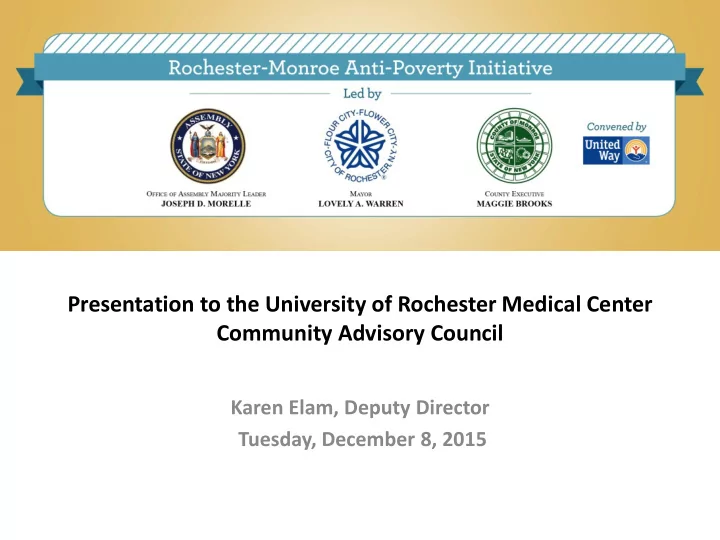

Presentation to the University of Rochester Medical Center Community Advisory Council Karen Elam, Deputy Director Tuesday, December 8, 2015
Rochester-Monroe Anti-Poverty Initiative (RMAPI) Beginning of Rochester-Monroe Anti-Poverty Initiative • In the summer of 2014 United Way, working with our partners in government, brought together a diverse set of stakeholders to respond to our deepening poverty epidemic. • In January of 2015, because of the formation of the Rochester- Monroe Anti-Poverty Initiative (RMAPI) by Majority Leader Morelle, Mayor Warren and County Executive Brooks, Governor Cuomo formed the Rochester Anti-Poverty Task Force. • Over the last nine months goals were set, workgroups convened, and our initial report was issued.
How is this different from the past? • United Way, a respected and credentialed community leader as convener • A focus on equity and creating self- sufficiency, where the system is responsive to individual needs, but part of a community-wide system of supports • An unprecedented partnership with New York State
Community input and involvement is key. Nearly 1,000 people in the region, including 200+ volunteers on committees and workgroups, 800+ community members, and most importantly, people with lived experience, have been involved with RMAPI: • Work Groups • Cultural Brokers • Insights from People Living in Poverty Study • Town Hall Meetings • Community Surveys • Individual and Group Interviews • Resource Teams
RMAPI Vision The vision of RMAPI is that every child and family has the opportunity to live in a stable environment where the promise of economic mobility is a reality.
RMAPI Goals Two overarching goals to achieve the vision: 1. Reduce poverty • By 50% in 15 years • By 30% in 10 years • By 15% in 5 years 2. Increase the number of families that are self-sufficient
The Work Group Process Eight work groups - Education - Justice - Health & Nutrition - Safe Neighborhoods - Housing - Childcare - Jobs/Workforce Development - Transportation Comprised of: – At least five people impacted by poverty – Front line workers – Focus area leaders 3+ days of work each (orientation, 2-day workshop, follow-up meetings)
Progress Report What is the report? • Findings of the work groups: 33 barriers and recommendations • Provides the foundation for future work and investment • Is a beginning point, not an end
Key Elements • Common Themes – Community Building – Structural Racism – Trauma • Initial Implementation Recommendations – Systems Design – Adult Mentoring/Navigating – Early Childhood Support
Impact of Poverty on our Health and Economy • Poverty affects all aspects of our community. • Poverty leads to poor public health outcomes, which affects public spending and, by extension, tax rates. • The result: the region is not working at capacity, slowing economic growth and leading to lower tax revenues and higher unemployment rates.
RMAPI Organizational Structure Steering Committee Leadership United Way Resource Teams Implementation Systems Design Policy Team Data Team Teams
RMAPI Work Structure Eight teams moving the initiative forward… • Resource Teams : Three teams of 14 members each (42 members) • Policy Team : 12 team members • Data Team : 12 team members • Systems Design : 8 – 10 team members • Implementation Teams : Two teams of 8 – 10 members each (16 – 20 members) • Total of 90+ team members plus staff
Team Charges Resource Teams Develop clearly defined principles and standards of practice that serve as the foundation for all implementation strategies and policy recommendations in three common areas: (1) Community Building, (2) Structural Racism, and (3) Trauma Policy Team Develops a policy agenda and work plan that includes strategies and tactics needed to advocate for policy proposals emerging from the RMAPI workgroups. Coordinates efforts with state, federal, and local government.
Team Charges Data Team Provides data and information management by identifying actionable community-level goals , establishing a goal tracking process , and monitoring progress toward achievement of goals. Systems Design Team Develops strategies for designing an integrated, coordinated system of social supports using input from IBM report and workgroup recommendations.
Team Charges Implementation Teams Develop detailed action plans and implement solutions needed to achieve dual goals of poverty reduction and self- sufficiency. Teams will be formed around each of the two initial solution areas: • Adult Mentoring/Navigating • Early Childhood Support
Beginnings of a coordinated system • Continue to align with FLPPS, human services and education partners around the social determinants of health • Build on the work of IBM Smarter Cities Challenge grant to implement an integrated system of social supports • Work to support the Beacon School concept and the Purpose Built Community project happening in the City of Rochester
Timeline October November December January February March IBM Engagement Recruit team Systems Design Launch team Team Recruit teams Finalized design Resource Teams principles Launch teams Recruit teams Implementation Launch teams Teams Recruit team Policy Team Launch team Data Team
Conclusion • We are solutions-focused and assets- oriented . • We have an unprecedented partnership with New York State and local government. • We are drawing from local and national expertise and experience. • We are engaging all levels of the community. For more information: endingpovertynow.org
Recommend
More recommend